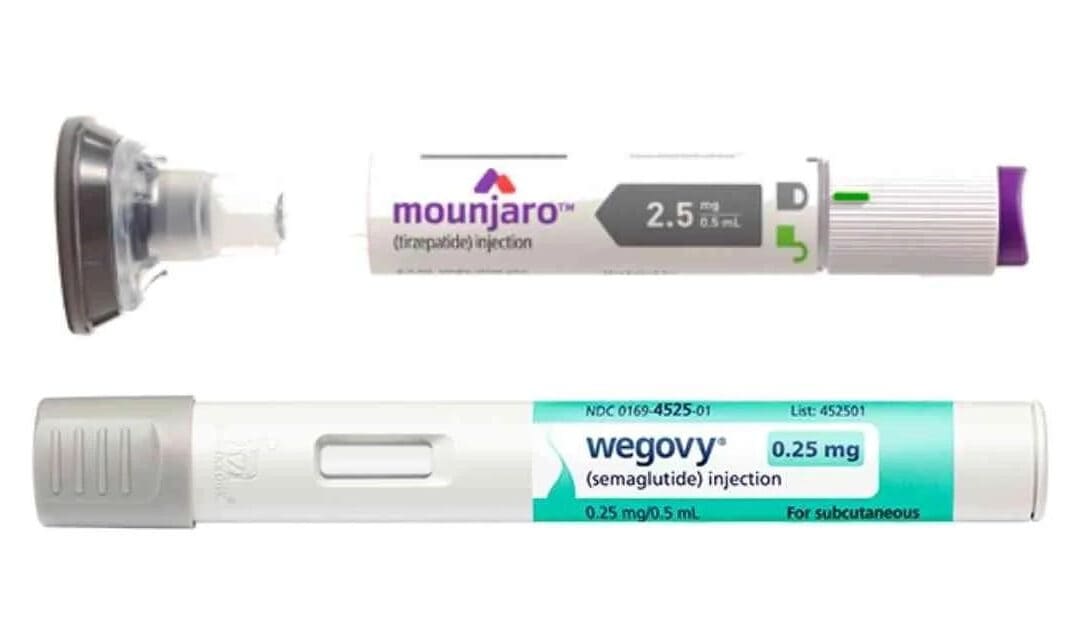
Wegovy vs Mounjaro: Which Is More Effective For Weight Loss?
Wegovy vs Mounjaro: Which Is More Effective For Weight Loss? Obesity has become a global epidemic, affecting millions of people worldwide. The prevalence of obesity has increased significantly over the past few decades, and it is now considered a major public health concern.
Obesity is not just a cosmetic issue; it is associated with a wide range of health risks, including heart disease, diabetes, stroke, and certain types of cancer. As a result, there is a growing need for effective weight loss solutions that can help individuals achieve and maintain a healthy weight.
In recent years, two weight loss medications have emerged as potential game-changers in the battle against obesity: Wegovy and Mounjaro. These medications have shown promising results in clinical trials and have been approved by regulatory authorities for the treatment of obesity.
In this article, we will explore the mechanisms of action, efficacy, safety, prescription requirements, cost, user experiences, and potential risks and limitations of both Wegovy and Mounjaro. By understanding these factors, individuals can make an informed decision about which medication may be right for them.
Understanding Wegovy and Mounjaro: How They Work to Combat Obesity

What Are The Best Prescription Weight Loss Drugs?
Wegovy and Mounjaro are both weight loss medications that work by targeting the body’s natural mechanisms for regulating appetite and metabolism. Wegovy is a once-weekly injectable medication that contains semaglutide, a synthetic version of a hormone called glucagon-like peptide-1 (GLP-1). GLP-1 is released by the intestines in response to food intake and helps regulate blood sugar levels and appetite. By mimicking the effects of GLP-1, Wegovy helps reduce hunger and increase feelings of fullness, leading to reduced calorie intake and weight loss.
Mounjaro, on the other hand, is a single molecule that activates glucose-dependent insulinotropic polypeptide (GIP) receptors and glucagon-like peptide-1 (GLP-1) receptors. GIP and GLP-1 are both natural incretin hormones. GIP has been shown to decrease how much you eat and increase your energy expenditure, which results in weight loss.
Both Wegovy and Mounjaro differ from other weight loss medications in their mechanisms of action. Unlike some other medications that work by suppressing appetite or increasing metabolism, Wegovy and Mounjaro target the underlying hormonal and neurological processes that regulate appetite and food intake. This targeted approach may make these medications more effective in helping individuals achieve and maintain weight loss.
Clinical Trials and Research: Wegovy vs Mounjaro: Which Is More Effective For Weight Loss?
Clinical trials have been conducted to evaluate the efficacy of both Wegovy and Mounjaro in promoting weight loss. In a clinical trial involving over 2,000 participants with obesity, those who received Wegovy lost an average of 15% of their body weight over a 68-week period, compared to 2.4% for those who received a placebo. Similarly, in a clinical trial involving over 4,500 participants with obesity or overweight, those who received Mounjaro lost an average of 8.1% of their body weight over a 56-week period, compared to 1.9% for those who received a placebo.
These results demonstrate that both Wegovy and Mounjaro can lead to significant weight loss when used as part of a comprehensive weight management program. However, it is important to note that individual results may vary, and weight loss outcomes depend on various factors such as adherence to the medication, diet, exercise, and overall lifestyle.
Safety and Side Effects: What You Need to Know Before Choosing a Weight Loss Medication

What Are Semaglutide Long-Term Side Effects?
Before considering any weight loss medication, it is important to understand the potential side effects and safety considerations. Both Wegovy and Mounjaro have been shown to be generally safe and well-tolerated in clinical trials. However, like any medication, they can cause side effects.
Common side effects of Wegovy include nausea, diarrhea, vomiting, constipation, and abdominal pain. These side effects are usually mild and tend to improve over time. In rare cases, Wegovy can cause more serious side effects such as pancreatitis, gallbladder disease, and kidney problems. It is important to discuss any concerns or symptoms with a healthcare provider.
Common side effects of Mounjaro include nausea, constipation, headache, dizziness, and insomnia. These side effects are usually mild and temporary. In rare cases, Mounjaro can increase the risk of seizures, high blood pressure, and liver problems. It is important to inform a healthcare provider of any pre-existing medical conditions or medications being taken before starting Mounjaro.
Prescription Requirements and Availability: Which Medication is More Accessible?
Both Wegovy and Mounjaro are prescription medications and require a healthcare provider’s prescription to obtain them. However, the prescription requirements may vary depending on the country and regulatory guidelines. In some cases, individuals may need to meet certain criteria, such as having a body mass index (BMI) above a certain threshold or having obesity-related health conditions, to be eligible for these medications.
Cost Comparison: Is Wegovy or Mounjaro More Affordable?
The cost of weight loss medications can vary depending on factors such as the country, healthcare system, and insurance coverage. As of now, Wegovy is a relatively new medication and may be more expensive compared to Mounjaro. However, the cost of these medications may change over time as more generic versions become available or as insurance coverage expands.
It is important to note that the cost of weight loss medications is just one factor to consider when choosing a treatment option. The potential health benefits and long-term cost savings associated with achieving and maintaining a healthy weight should also be taken into account. Additionally, some pharmaceutical companies may offer patient assistance programs or discounts to help make these medications more affordable for individuals who need them.
User Experience and Success Stories: Real-Life Results of Using Wegovy and Mounjaro

Semaglutide – Before And After Results
Real-life user experiences and success stories can provide valuable insights into the effectiveness and tolerability of weight loss medications. Many individuals who have used Wegovy or Mounjaro have reported significant weight loss and improvements in their overall health and well-being.
For example, Sarah, a 35-year-old woman with obesity, started using Wegovy as part of a comprehensive weight management program. Over the course of a year, she lost 50 pounds and experienced improvements in her blood pressure, cholesterol levels, and energy levels. She credits Wegovy for helping her break through her weight loss plateau and regain control of her health.
Similarly, John, a 45-year-old man with overweight, started using Mounjaro after struggling with his weight for years. With the help of Mounjaro, he was able to lose 30 pounds and reduce his cravings for unhealthy foods. He also noticed improvements in his mood and motivation to exercise.
It is important to remember that individual experiences may vary, and weight loss outcomes depend on various factors. It is also crucial to use these medications as part of a comprehensive weight management program that includes a healthy diet, regular exercise, and lifestyle changes.
Lifestyle Changes and Support: The Role of Diet and Exercise in Achieving Long-Term Weight Loss

Healthy Foods
While weight loss medications can be effective tools for achieving initial weight loss, they are not magic pills. Sustainable weight loss requires long-term lifestyle changes, including a healthy diet and regular exercise.
Weight loss medications can help individuals control their appetite and reduce calorie intake, but they should be used in conjunction with a balanced diet and physical activity.
A healthy diet should include a variety of nutrient-dense foods, such as fruits, vegetables, whole grains, lean proteins, and healthy fats. Portion control and mindful eating can also play a crucial role in weight management. Regular physical activity, such as aerobic exercise and strength training, can help burn calories, build muscle, and improve overall fitness.
In addition to diet and exercise, support and resources can be instrumental in achieving long-term weight loss. Support can come from healthcare providers, registered dietitians, psychologists, support groups, or online communities. These resources can provide guidance, motivation, accountability, and strategies for overcoming challenges.
Potential Risks and Limitations: Factors to Consider Before Starting a Weight Loss Medication
Wegovy vs Mounjaro: Which is more effective for weight loss? Before starting any weight loss medication, it is important to consider the potential risks and limitations. Weight loss medications are not suitable for everyone and may not be appropriate for individuals with certain medical conditions or those taking certain medications. It is crucial to consult with a healthcare provider before starting any weight loss medication to ensure it is safe and appropriate.
Weight loss medications are also not a quick fix or a permanent solution. They should be used as part of a comprehensive weight management program that includes lifestyle changes. Once the medication is discontinued, it is important to maintain healthy habits to prevent weight regain.
It is also important to note that weight loss medications are not recommended for individuals with mild or moderate overweight. These medications are typically reserved for individuals with obesity or those with overweight and obesity-related health conditions. Lifestyle changes, such as diet and exercise, are usually the first-line treatment for individuals with mild or moderate overweight.
Conclusion of Wegovy vs Mounjaro: Which Is More Effective For Weight Loss?
In conclusion, Wegovy and Mounjaro are two weight loss medications that have shown promise in helping individuals achieve and maintain weight loss. Both medications work by targeting the body’s natural mechanisms for regulating appetite and metabolism. They have been shown to be effective in clinical trials and are generally safe when used as directed.
When considering which medication is right for you, it is important to consider factors such as the mechanisms of action, efficacy, safety, prescription requirements, availability, cost, user experiences, and potential risks and limitations. It is also crucial to consult with a healthcare provider who can assess your individual needs and goals and provide personalized recommendations.
Ultimately, the decision to use a weight loss medication should be based on a comprehensive approach that includes lifestyle changes, such as a healthy diet and regular exercise. Weight loss medications can be valuable tools in the battle against obesity, but they should be used in conjunction with a holistic approach to achieve long-term success.






